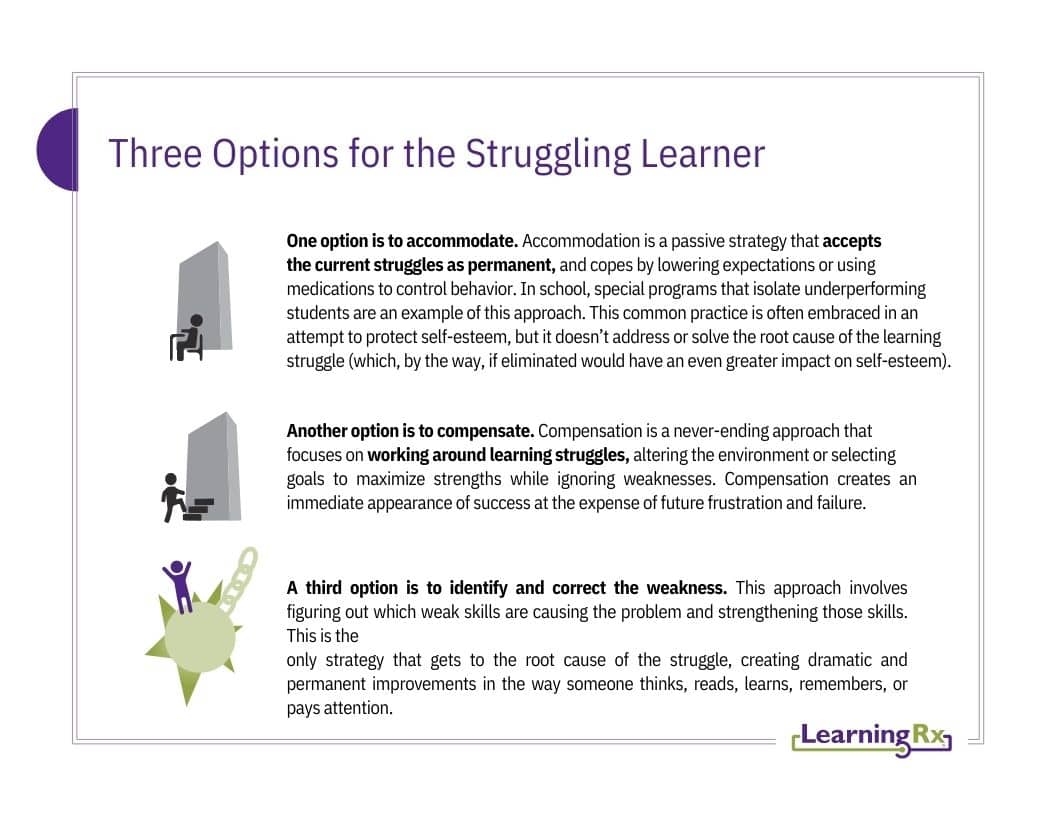If Your Child is Struggling, You Have 3 Main Options
Accommodate Accommodations are a passive strategy that accepts the current struggles as permanent, and copes by lowering expectations or using medications (like ADHD medication) to control behavior. An IEP would be an example of this.
For example, when a child is diagnosed with ADHD, they often receive accommodations that allow them to do their work in a quiet space. They may also be allowed more time to complete tasks. This may make school easier, but only perpetuates the weakness and is not preparing them for life after school when they will not likely receive accommodations from their employer.
This strategy does not address or solve the root cause of the learning struggle but focuses on making the task easier by lower expectations for the student.
Compensate: Compensation is a never-ending approach that focuses on working around learning struggles, altering the environment for your child, or selecting goals to maximize strengths while ignoring weaknesses. Compensation creates an immediate appearance of success at the expense of future frustration and failure.
An example of this strategy would be changing the type of school your child may be attending for smaller class sizes or more of a project-based environment. This is not addressing the issue but treating the symptom by avoiding certain environments.
Identify and correct the weakness. This approach involves figuring out which cognitive skills are causing the difficulty and strengthening these skills. This is the only strategy that gets to the root cause of the struggle, creating dramatic and permanent improvements in the way a student thinks, learns, remembers and pays attention.
At LearningRx, our approach is to identify and address the root cause which is usually linked to a combination of cognitive skill weaknesses. When a child has consistent struggles with attention, reading, motivation, executive function or homework frustration, the cause is usually related to core skills that are not as strong as they need be.
For example, rather than provide accommodations for a child struggling with ADHD, we identify the root cause and address that weakness. For students with ADHD, per our peer-reviewed research published in the Journal of Mental Health and Clinical Psychology, it is common that the root cause of attention difficulties can be a weakness in processing speed. When processing speed is slow, the student is forced to expert significant mental energy in doing an academic task – i.e. listening to a lecture, reading a text book – that they are unable to sustain that high level of energy and zone out. Is this truly an attention issue? It presents as an attention issue, but the root cause is low processing speed. In this case, our training focuses on strengthening processing speed which in turn, improves attention for those with ADHD.
Obviously, the 3rd option is ideal. If your main strategies are around accommodating and/or compensating, you will never address the root cause and as each grade level increases in difficulty, these weaknesses will become a greater obstacle to learning.
To take the first step in understanding the root cause of your child’s struggles, call the Savage/Prior Lake location to schedule an initial cognitive skills assessment. This standardized assessment will provide insights as to why your child is struggling and includes a consultation to walk you through the results and answer any questions that arise.
Mention this article and receive $100 off the initial assessment.







